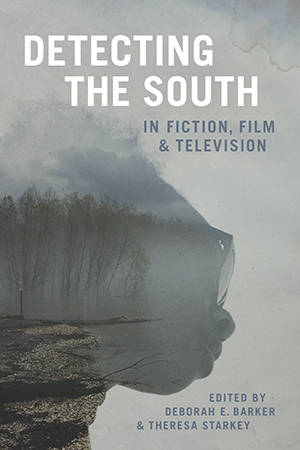
376 pages / 6.00 x 9.00 inches / 2 halftones
Literary Criticism / Mystery and Crime | Literary Criticism / American - Regional | Performing Arts / Film / Crime
The mean streets that tough, trench-coated detectives travel are so often associated with urban settings—typically New York or Los Angeles—that audiences can easily overlook the presence of the American South in crime fiction and film noir. Recent years have witnessed a growth in the production and popularity of southern noir and detective narratives, with works such as James Lee Burke’s Dave Robicheaux novels and the first season of True Detective attesting to the powerful impact of the southern imaginary on the genre.
Edited by Deborah E. Barker and Theresa Starkey, Detecting the South in Fiction, Film, and Television offers the first collection of essays examining the detective genre as transfigured in works dealing with the South. This southern turn foregrounds three vital and interrelated topics: the acknowledgment of race as it relates to slavery, segregation, and discrimination; the role of land as a source of income, an ecologically threatened space, or a place of seclusion; and the continued presence of the southern gothic in recurring elements such as dilapidated plantation houses, swamps, family secrets, and the occult. This wide-ranging volume gives voice to the artists who strive to expose the history and lasting implications of southern settings conditioned by economic exploitation, unquestioned whiteness, and racial trauma. Inspecting the works of writers including John D. MacDonald and Donna Tartt, and visiting scenes from Mayberry and Nashville to New Orleans, the authors of these thoughtful essays probe how southern detective narratives intersect with popular genre forms like neo-noir, hardboiled fiction, the dark thriller, suburban noir, amateur sleuths, journalist-detectives, and television police procedurals.
Alongside essays by critics, Detecting the South in Fiction, Film, and Television presents pieces by authors of detective and crime fiction, including Megan Abbott and Ace Atkins, who address the extent to which the South and its artistic traditions influenced their own works. By considering the diversity of authors and characters associated with the genre, this accessible collection provides an overdue examination of the historical, political, and aesthetic contexts out of which the southern detective narrative emerged and continues to evolve.
Deborah E. Barker, professor of English at the University of Mississippi, is the author of Reconstructing Violence: The Southern Rape Complex in Film and Literature and Aesthetics and Gender in American Literature: Portraits of the Woman Artist. She coedited, with Kathryn B. McKee, American Cinema and the Southern Imaginary.
Theresa Starkey is associate director of the Sarah Isom Center for Women and Gender Studies at the University of Mississippi. Her scholarship and creative work have appeared in the Oxford American, Mississippi Review, and elsewhere.
Found an Error? Tell us about it.